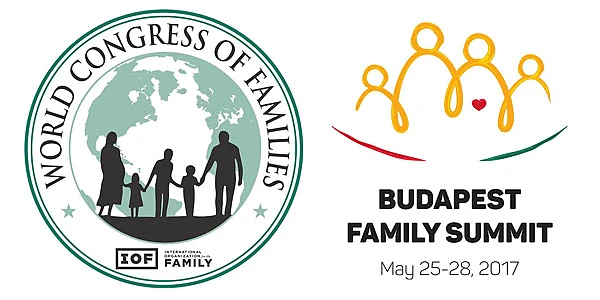Romania at the crossroads: the battle for family and the European civilization model.

Speech delivered by Mr Bogdan Stanciu, President of PRO VITA Bucharest, at the 11th edition of the World Congress of Families, Budapest, May 27th, 2017.PRO VITA Bucharest is a non-governmental and non-profit organization, with a Christian and social profile, which aims at promoting the values of human life since conception, of family and parental vocation, by means of efficient education, civic involvement and legal issues. PRO VITA also is a member of Sallux – formerly European Christian Political Foundation
Ladies and Gentlemen,
Today, Romania is at the forefront of the battle for family and for preservation of the European civilization model, grounded on the marital union and on strong and independent families. We prepare ourselves for a referendum to inscribe in the Constitution the correct definition of marriage and family. If we succeed, we will join a trend, which has now become certain, of States in Eastern Europe to protect the fundamental social institutions – as Hungary did a few years ago as well. In the meantime, the European Court of Justice considers a case in which a Romanian man, married to another man, asks the Court to exactly define what the term ‘spouses’means. The decision will affect all countries in the bloc.
Therefore, I am sure you want to know something about us.
Romania is a country where most people express, both at the census and when asked in sociological surveys, faith in God and belonging to a Christian denomination, mostly to the Orthodox Church.
Also, Romania is a European country. And it is not a European country because it joined the European Union, but is an European country that belongs to the cultural, human and geographical great family of the European peoples, family that cannot be restricted to the group of countries that have concluded a political and economic alliance which is called the European Union.
Nevertheless, Romania is also a member of the European Union, and has the responsibility as a State, as a nation, to prevent the transformation of this alliance in a non-Christian ideological project and implicitly anti-European.
However, part of the Romanian people, and unfortunately much of its intellectual elites, humiliated and impoverished during the communist experiment, lost Christian and European dignity, living in mimetic admiration to what they consider to be „the true Europe”, actually the „culture of death” denounced by Pope John Paul II (the second), the „dictatorship of relativism” which Pope Benedict XVI (the sixteenth) warned about, which included, unfortunately, the West.
This happened also because the West that we were shown after the fall of communism was actually an ideological Mc-menu offered by NGOs funded directly by the American billionaire George Soros or interest groups similar to it.
The first NGOs in Romania, the first generation of Romanian scholars abroad, the first civic projects were made under the ideological tutelage of the Western progressive left political wing. Our civil society fledgling communism was ideologically “parented” by Soros people, with consequences difficult to erase even 27 years after the Revolution.
Therefore, the effort to save the fundamental institutions of society, especially the family, have been still considered by a part of the Romanian intelligentsia as… anti-European and anti-Western, even communist.
The fact that communism, after legalizing abortion, decided, being aware of the social consequences, to strictly limit it, has created an illusion: that abortion was a „human right” that only some Communists would be able to prohibit.
This illusion was maintained by the new ideological commissioners undertaking control over the Romanian civil society, taking advantage of the financial support of Mr. Soros foundations and, why not admit it, by some Western embassies who seem more interested in the moral destruction of Romanian society than in the good diplomatic representation of their countries. That is why we had and still have to lead a constant and very difficult struggle to explain things that are commonplace and obvious fact:
First, that we cannot reduce Europe to a momentary ideological fashion. We must not confuse Europe, having its history of millennia, of which 2000 years into the Christian faith with ideological fantasies and with a „religion of sexuality” that ravaged the continent in the last 50 years.
Then, to understand that we, the Romanians, we, the Eastern Europeans, with all our good and bad, are as European as the French, British or Spanish.
Being European is a given historical and cultural fact and does not need Brussels, Strasbourg and even less NGOs validation, come out of Mr. Soros hat and his ideological friends.
This is actually the brunt of the work done by us in these years. And the brunt that we carry onward as well: to liberate civil society from the ideological captivity, to convince Romania that the siren song of ideologies is no alternative and that Europe’s future depends only on the future of European nations and on the cultural and religious identity of these nations.
If these nations will lose their identity, they will lose the values that built Europe’s history; Europe itself will cease to exist.
26 years after the communist fall, despite some unhidden efforts of „drawing up” the souls and minds of Romanians, I gladly noticed that the Romanians are a people hard to mellow.
I have seen first as 93% percent of the Romanian students (and their parents) willingly chose to attend confessional religious education courses in public schools in Romania during the first year which called for an express, distinct entry to this class (which called for an optional entry to this class).
Then we had, despite restrictive legislation and an aggressive overt campaign against us, the Coalition for Family first great victory and a first great victory of the Romanian civil society: we gathered over three million signatures to clarify the constitutional text on family and marriage.
A civic initiative that gathered 3 million of signatures collected throughout Romania, under restrictive law on citizens’ initiatives, in a population of about 18 million people, means not only a great civic victory but also sends a strong political message.
After 27 years, the Romanian Orthodox Church, together with almost all Christian denominations in Romania have committed to support a civic approach and implicitly assumed an important role not only for the present but also for the future of Romanian society: that of active actors in the civil society.
Similarly, non-governmental organizations born in Mr. Soros hat and in the shade of some embassies, but who, years in a row, have assumed the role of legitimate civil society in Romania, were put off-side, demonstrating the visible huge rift between their strongly ideological agendas and the Romanian society real agenda.
Political parties in Romania, used to a relatively apathetic society, insensitive to large matters of well-advised doctrine, faced with a situation new to them: Romania troubled by a problem that is not related to material wealth, but to the need of normality. This problem, the family and its protection, by asserting in the Constitution the normal definition of marriage: as between a man and a woman, was the first major doctrinal test for Romanian parties.
Surprises did not fail to appear: The Social Democratic Party, political family member of the European Socialists, has supported this initiative, although the European socialists, as we know, are far from being committed to the cause of defending the family from ideological innovations.
The National Liberal Party, the right-wing Romanian party, member of the EPP (the European Popular Party), has also supported, from the beginning, the civic initiative, although several voices invoking liberalism had explicit position against the Coalition for Family initiative.
ALDE, (The Liberal and Democrat Coalition Party) a relatively recent political group, was also in favor of our initiative, despite the fact that its European political family (the European liberals) is among the most progressive parties in the European Union.
The first unpleasant surprise came from the President of Romania (especially elected byThe National Liberal Party and, hence, an EPP member) who, in a misinformed statement, accused the Romanians, signatories of the civic initiative, of lack of tolerance. In another statement, he said that the civic initiative that gathered the signatures of nearly 20 percent of the voting population in Romania would not have… actually, „penetrated” the Romanian society!
The party that has made the most consistent opposition to the Coalition for the Family initiative was, and here there is no surprise, the „Save Romania” Union, a new political entity, evidently representing the world of NGOs and Romanian public intelligentsia I was talking about during the first part of my speech.
Summarizing, it may be noted that in Romania, our initiative has also helped to an ideological clarification, to a ‘water split’ that will have consequences at European level as well.
Our battle is far from over.
The citizens’ initiative to protect the family and marriage in the Constitution has been validated by the vote of the Chamber of Deputies. There is another political battle in the Senate yet to follow and then the referendum itself.
The referendum will be an important test and I am convinced that, by passing it, Romania will make an important step, as a society and as a State, towards becoming a voice that Europe and the Western civilization needs.
Thank You.












































































































MULTUMESC!
ApreciazăApreciază